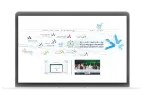
This page contains information about the program in Arabic and English
تم تصميم البرنامج لسد الفجوة بين الأوساط الأكاديمية وريادة الأعمال. ويهدف إلى تزويد الأساتذة والباحثين بالأدوات والمهارات اللازمة لترجمة خبراتهم الأكاديمية ونتائج البحوث إلى مشاريع ريادية ناجحة من خلال توفير الموارد والإرشاد والدعم لتحويل البحث الأكاديمي المبتكر إلى مشاريع تجارية ناجحة.
عام واحد.
> تعزيز ثقافة ريادة الأعمال داخل المجتمع الأكاديمي.
> سد الفجوة بين البحث الأكاديمي والحلول العملية التي يحركها السوق.
> دعم الأكاديميين في تحقيق الإمكانات التجارية لأبحاثهم.
Academic Entrepreneur Empowerment
Program Description:
The program was designed in collaboration with King Abdullah University of Science and Technology (KAUST) to bridge the gap between academia and entrepreneurship. It aims to provide professors and researchers with the tools and skills necessary to translate their academic experiences and research results into successful entrepreneurial projects by providing resources, guidance and support to transform innovative academic research into successful commercial projects.
Program duration: one year.
Program Goals:
· Promoting a culture of entrepreneurship within the academic community.
· Bridging the gap between academic research and practical market-driven solutions.
· Support academics in realizing the commercial potential of their research.
Program Components:
The program includes entrepreneurship training, mentorship, financing assistance, incubation support, and networking opportunities.
· Training and workshops in the field of entrepreneurship (KAUST)
- Comprehensive training programs covering business basics, market strategy, financial management, and leadership skills.
- Specialized sessions on intellectual property management, legal considerations, and logistics for startups.
· Guidance and guidance of experts (Monshaat) (Jeddah Chamber):
- Access to a network of successful entrepreneurs, business leaders and industry experts for guidance and advice.
- Regular one-on-one mentoring sessions tailored to meet the specific needs of each academic entrepreneur.
· Financing and resource allocation:
- Providing seed funding for promising projects through the University’s internal grant system.
- Guidance in securing funding, including grants, angel investments and venture capital.
· Incubation and acceleration support:
- Partnering with business incubators and accelerators to provide resources such as workspace, access to technology, and administrative support (garage)
- Support in prototype development, beta testing and market entry strategies.
Participation Criteria:
· Academic background: for professors, researchers, and graduate students affiliated with the University of Jeddah.
· Innovative idea: Applicants must present a unique and innovative idea or research results with commercial potential within the University’s research priorities and national priorities.
· Commitment: Commitment to pursuing an entrepreneurial project alongside or beyond their academic responsibilities.
· Scalability and impact: The project must have scalability and significant societal or economic impact.
Expected Outcomes:
· Startup Launching: Successful launch of startups based on academic research, and contribution to industry and societal progress.
· Job creation: Creating new job opportunities through these pioneering projects.
· Academic-Industry Links: Stronger links between the University and business, leading to opportunities for collaboration and knowledge exchange.
· Innovation Environment: Develop an ecosystem that fosters innovation and entrepreneurship within the academic community.
· Business success stories: Success stories of academics who have turned their research into profitable and sustainable businesses.
· Ongoing support system: Create a sustainable support system for future academic entrepreneurs.
Applying to the program:
- Application form: Complete the application form on the Kafaa platform.
- Business Idea Proposal: Submit a detailed business proposal that explains the idea, its uniqueness, market potential, and how to leverage academic expertise.
- Application Deadline: Ensure that applications are submitted before the announced deadline.
- Interviews: Selected candidates will be invited for an interview or to submit their proposals to the selection committee.
- Acceptance Notification: Successful applicants will be notified via email and will receive further instructions about starting the program.
Timetable:
Stage One: program announcement and information sessions
· The official launch of the program for this year 2024
· Issuing detailed program guidelines, eligibility criteria, and application instructions.
· Host online Q&A sessions for interested applicants.
Stage Two: application period
· Opening the application portal.
· Applicants can submit their proposals, business plans and other required documents.
Stage Three: Application review and shortlisting
· Closing the application portal.
· Review of applications by a committee of experts (formation of a committee)
· Shortlisting candidates based on specified criteria. (Nomination criteria form)
Stage Four: interviews and final selection
· Conduct interviews or presentations with selected candidates. (Interview Nomination Form)
· Final selection of program participants.
· Successful applicants notified via email.
Stage Five: guidance and qualification
· An orientation session for selected participants to familiarize them with the program structure, mentors and resources.
· The onboarding process, including establishing mentor-mentee relationships and accessing resources.
Stage Six: Program implementation (KAUST)
· Implement core program components such as workshops, mentoring sessions and incubation support.
· Mid-year review and feedback sessions.
· Continuous follow-up and support for project development.
Stage Seven: Selecting projects for seed funding
· Expert panel review: This committee consists of individuals with expertise in relevant fields, including academic research, business development, and project finance (a panel of the academic community, industry community, and investors).
· Evaluation criteria: Evaluate proposals based on innovation, feasibility, potential impact, scalability and team capacity (Form)
· Decision making: The committee makes final funding decisions based on the quality of the proposal and presentation and alignment with funding objectives.
· Funding Agreement: Successful applicants enter into a financing agreement setting out the terms and conditions of the initial funding. (Contract)
· Spending Plan: Develop a spending plan based on the project parameters. (document)